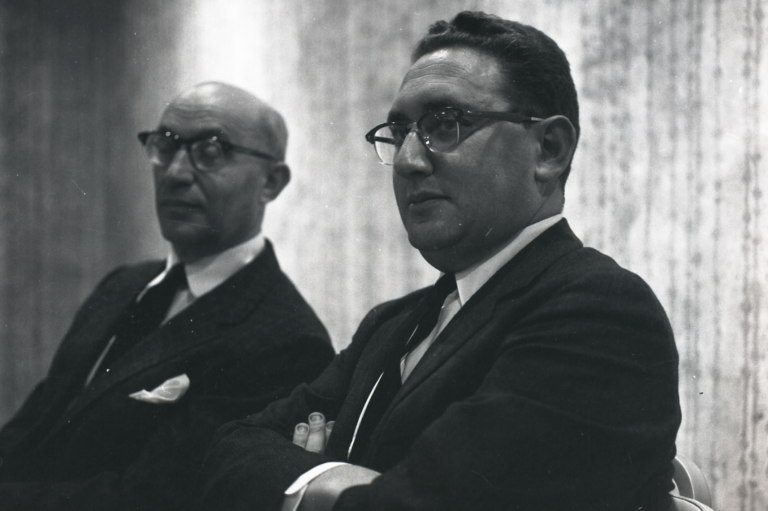As pressures for euthanasia mount on the European continent, memories of the involvement of German physicians and intellectuals in Nazi atrocities haunt the debate. At a 5 November press conference in the Brussels International Press Center, the European Medical Education Trust warned of the tragic outcome that will inevitably follow if the European nations again succumb to these pressures.
Participating in the press conference were Dr. Peggy Norris, M.B. Ch. from England; Dr. Karel Gunning, Honorable Secretary of the Dutch Physicians Association; Professor S. Wulfes, recently retired from the University of Cologne; Frau Wilma Kobush, who was born with spina bifida in 1936; and Professor Charles Deckers, Department of Radiotherapy at the University Clinic of St. Luc, Woluwe.
Dr. Norris, Honorable Secretary of the Medical Education Trust, addressed the press: “A law permitting doctors to deliberately end the lives of their patients, either by action or commission, would destroy the centuries-old Hippocratic ethic of ‘First Do No Harm’.” She said that this ‘Hippocratic ethic’ had built up a relationship of trust between patients and doctors which remains imperative. “The sick, the aged, and people with physical and mental disabilities — and nowadays the survivors of severe brain damage — are very vulnerable,” she claimed. “Doctors are in a position of power. It is vital that patients are certain that their doctors would never deliberately harm or kill them.”
Dr. Norris quoted at length from the Council of the British Medical Association’s 1988 Euthanasia Report :
The law should not be changed and the deliberate taking of a human life should remain a crime. This rejection of a change in the law to permit doctors to intervene to end a person’s life is not just a subordination of individual well-being to social policy. It is, instead, an affirmation of the supreme value of the individual, no matter how worthless and helpless that individual may feel. (British Medical Journal, 14 May 1988).
According to Dr. Norris, there is a danger that, “As in Holland, the lives of the sick and elderly will become endangered. So, the vulnerable in British society may be the next to be dispatched?
Press Conference Statement, November 5, 1991
A statement prepared by Frau Kobusch was released:
The current massive efforts to legalize assisted suicide, voluntary and involuntary euthanasia and the killing of defective newborns is extremely threatening for disabled people. It has been accompanied over the years by a systematic devaluation and degradation of handicapped life and the violation of the constitutional rights of the disabled. Philosophers and other scientists have done this under the cover of academic freedom and freedom of speech.
In June 1986, the German Association of Medical Law established “Limits on the Obligation to Treat Severely Handicapped Newborns,” listing criteria which are so vague and unspecific that it would be possible to get rid of virtually any handicapped newborn. But the record of the discussion sessions is even more menacing and revealing. The committee, consisting of doctors, lawyers and members of the Roman Catholic and Protestant clergy, did not include one single expert on special education or rehabilitation, let alone a handicapped adult or the parent of a handicapped child.
Meanwhile, university professors, doctors, clergy, and disabled and non-disabled people from all over the Federal Republic of Germany have launched an initiative against the so-called “Einbeck Recommendations.” They have submitted their objections to the government, because the constitutional right to life of a handicapped child can only be scrapped by parliamentary decision, and not by a self-appointed body of experts under medical pretexts.
In August 1991, the director of the Neurosurgical Clinic and Polyclinic of Ruprecht-Karls-University of Heidelberg approached spina bifida patients or their parents with a questionnaire concerning the quality of their life. This was done, allegedly, to improve the quality of life of future newborns through neurosurgical intervention. The questionnaire asked for the frequency and length of hospital stays, the number of operations, the consequences [of their handicap] in terms of education and professional occupation and the reaction of others in their lives. To those of us who are familiar with the Lorber debate and the fact that spina bifida children are again discussed in literature as potential candidates for being “allowed to die,” the Heidelberg initiative is questionable and highly alarming.
In 1989, Fletcher and Wertz published “Ethics and Human Genetics — a Cross—cultural Perspective” comparing the practice of human genetics in 19 countries. In ranking the goals of genetic counseling, the German participants in the study rated “the reduction in the number of carriers of genetic disorders in the population” at 38 percent (p. 34). Obviously, the eugenic concept of “Volksgesundheit” has survived the debris of the Third Reich undamaged.
In 1989 Dr. Quambusch, a German professor of law, published a paper on the meaning of the constitutional concept of dignity in respect to the mentally disabled and he concluded, “… that they are only entitled to a lesser dignity than the non-disabled. This is supported by social data clearly showing the tendency to reject and exclude the mentally ill.” The “social data” he then quotes for evidence ranges from the rejection of impaired children by non-disabled children, to the feelings of the general public towards mentally handicapped children (47 percent consider them sinister, 44 per cent feel dismay and 42 percent abhorrence).
A German philosopher of Saarbrucken University recently attempted to quantify the value of life with the help of economic decision theory. He defined the value of the life of person X as the sum total of the values of each increment of X’s life — converted into Deutschmarks. Thus he is able to weigh one life against the other and assess what value death will have for X, i.e., how good or had it would be for X to be dead. The philosopher no longer speaks of voluntary or involuntary euthanasia, but of “lethal alternatives,” and people to be subjected to euthanasia figure throughout his (unpublished) paper as “Euthanisanden” (euthanasees!). It is important to note that (as opposed to specialized technical contexts) the suffix “and” or 2 “ant” in everyday language denotes anodal, negatively connotated types of persons, as anyone familiar with theories of racism will know.
Recently, professor Ursula Wolf of the Free University of Berlin published a book to further the cause of animal protection (Das Tier in der Moral, 1990). The book contains passages like the following: “How can animal experimentation be allowed, when similar treatment of human beings, even of those whose mental capabilities place them on the same level or even below the level of laboratory animals is rejected?” And, “In fact, experimentation on weak-minded humans is morally permissible” (p. 110).
The German Association of Analytical Philosophy proposed Wolf, in consideration of the “merits” of her book, for this year’s Felix Wankel Animal Protection Research Award.
In his book Ethics and Disability (Ethik und Behinder-ung, 1990) Christoph Anstotz, a German professor of special education, suggests that the reader familiarize himself with the Anglo-American ethics debate, recommending J.G. Murphy’s essay titled, “Do the retarded have a right not to be eaten?” Anstotz defends Murphy’s views stating: “… those who reject the comparison of the severely disabled with animals should first of all ask themselves, if they are not a priori attaching a morally inferior status to animals” (p. 104).
Bioethical positions are also making inroads at high schools. There are textbooks suggesting that pupils should form an “ethics committee” to decide whether a newborn with Down’s syndrome was rightly kept alive; that pupils be made aware that the happiness of the mentally disabled cannot be counted as real happiness, since nobody would want to be in his place; and that one of the pupils should assume the role of “Peter Singer” and present and defend Singer’s theory on the euthanasia of defective newborns, (K. Kunz, Fertig Ausgearbeitete Unterrichtsbausteine fur das Fach Ethik/Werte und Normen, 1990)
Handicapped individuals and groups, fighting these new assaults on their dignity and very existence, are ridiculed by the proponents of bioethical positions. We are called fundamentalist, intolerant, emotional and irrational. In a recent BBC interview Peter Singer said, “it is almost as if someone who could not walk due to a disability were to say that we ought not fix broken legs, because if there were more people around with broken legs there would be a stronger lobby for wheelchair access.”
For someone like me, who has escaped extermination by the Nazis only because of the ingenuity of her parents, an infamous statement like this is shocking and utterly disgusting. It clearly shows what we disabled are in for under the guise of humanity and compassion in a pluralistic society.
The covert “scientific” degradation of the disabled, ill or old people is one of the most gruesome and devastating consequences of the so-called Singer debate. Obviously, even philosophers campaigning for euthanasia seem to be aware of it. In their essay “Euthanasia, Ethics and Economics” published in April 1990 in the periodical Bioethics, the Finnish philosophers H. and M. Hayri write, “… But even if the legitimacy of intentional killing is taken for granted, the question concerning the legitimate killer remains .… They suggest, “… special training programs should be organized for ‘killer doctors,’ partly if not entirely designed to weaken the psychological barriers such doctors share with every decent person against taking the lives of innocent human beings.”
Epilogue
It is barely believable that in the short time span of fifty years, the world is again facing the horrors of eugenic murder. It is even less believable that so many who fought against Nazi genocide are apparently agreeing to the world-wide pressures for euthanasia. How could the shocked revulsion of the past become the passive acceptance of the present?
Professors S. Wulfes and T. Hofmann, Department of Special Education of the University of Cologne raise the questions:
We, the presently officiating higher education teachers and scientific colleagues of this specialty, belong to the post-war generation .…We have asked our relatives and their friends how eugenics and euthanasia of unworthy life and mass annihilation were possible .… We lived locked into the error that this phase of German history was unrepeatable .… Today we clearly see how little of Germany’s past has been overcome in reality.
Previous generations fled to countries where a strong ethic existed to shield them from the madness, now that madness has become universalized.










